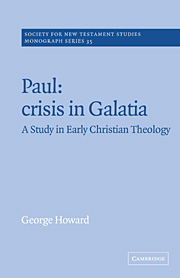Book contents
- Frontmatter
- Contents
- Preface to the first edition
- Preface to the second edition
- Introduction to the second edition
- Abbreviations
- 1 Paul's opponents in Galatia
- 2 Paul the apostle to the Gentiles
- 3 Justification by faith
- 4 Paul's view of the law
- Notes
- Bibliography
- Index of subjects and names
- Index of passages quoted
2 - Paul the apostle to the Gentiles
Published online by Cambridge University Press: 22 September 2009
- Frontmatter
- Contents
- Preface to the first edition
- Preface to the second edition
- Introduction to the second edition
- Abbreviations
- 1 Paul's opponents in Galatia
- 2 Paul the apostle to the Gentiles
- 3 Justification by faith
- 4 Paul's view of the law
- Notes
- Bibliography
- Index of subjects and names
- Index of passages quoted
Summary
When we come to the autobiographical section of Galatians (1:13–2:14) it is widely held that Paul's purpose is to prove, in face of charges to the contrary, that he is independent of the Jerusalem apostles and that they fully recognize his apostolic position in the church. The letter begins: ‘Paul an apostle, not from men nor through man but through Jesus Christ.’ The point is held to be clear. ‘Paul is said to have received his apostolate, not immediately from God, as befits an apostle, but from or through men.’ According to this theory, the apostle denies his dependency on the other apostles by describing his past relationship with them as being limited and for the most part amiable. At the time of his conversion he conferred with no one. not even the Jerusalem apostles. Only after a stay in Arabia and a lapse of three years did he go up to Jerusalem for the first time after his conversion. Even then he stayed only fifteen days with Peter and of the other apostles he saw only James. For the truth of this he calls God as a witness. Then he went into the regions of Syria and Cilicia and remained unknown personally to the Judean churches. They only heard that he was now preaching the faith that he once persecuted and they glorified God.
- Type
- Chapter
- Information
- Paul: Crisis in GalatiaA Study in Early Christian Theology, pp. 20 - 45Publisher: Cambridge University PressPrint publication year: 1990



